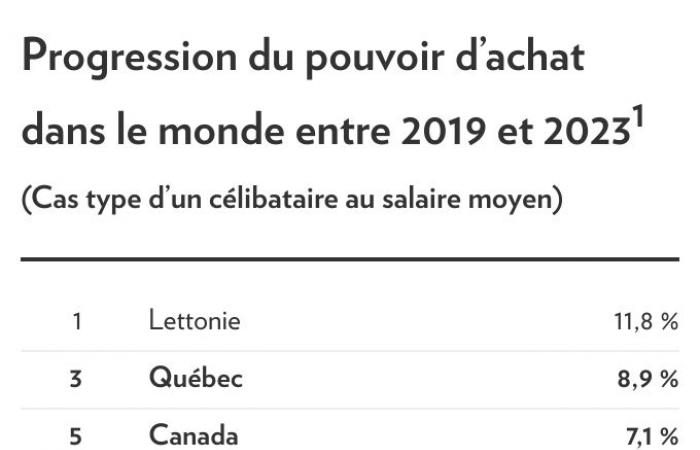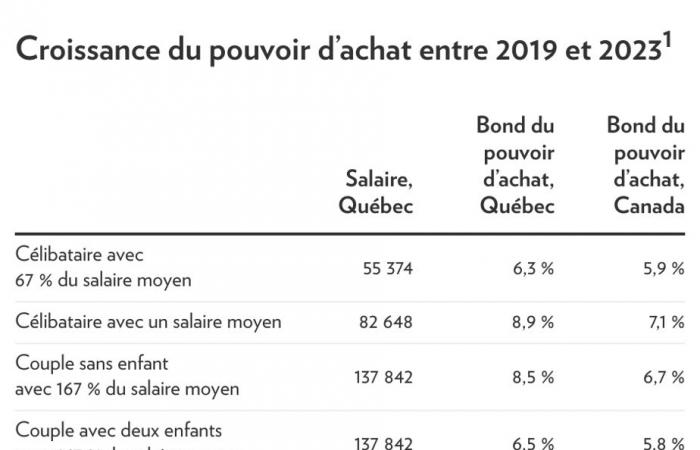I was surprised by the conclusions on the purchasing power of Quebecers, as much as you will be after reading this column.
Posted at 6:30 a.m.
The numerical facts are indisputable: despite the pandemic and inflation, Quebec workers have considerably increased their purchasing power in recent years, more than most taxpayers in the world. And this observation applies to almost all salary strata.
The analysis was carried out by researchers from the Research Chair in Taxation and Public Finance at the University of Sherbrooke. The study casts a wide net, analyzing the situation of eight typical households in 31 countries, plus Quebec.
It compares the growth in disposable income of full-time adult workers aged 65 and under between 2019 and 2023, that is, between the year preceding the pandemic and the year following its end. Disposable income represents the share of income available to individuals once taxes and contributions have been paid, to which are added the transfers received.
In summary, the purchasing power of single people with an average salary increased by 8.9% between 2019 and 2023 in Quebec, once inflation is taken into account.
This increase places Quebec in 3e world ranking in comparisons. For Canada as a whole, the increase is 7.1%.
The situation of Quebecers and Canadians contrasts with that of most large industrialized countries. Once inflation was taken out, purchasing power was stagnant in France and the United States, while it fell by 3.2% in Italy and 6.1% in Sweden.
This observation on purchasing power – widely publicized in France – is probably one of the factors explaining the political tensions in these countries, the middle class feeling that the economic and geopolitical situation has made it lose its feathers.
Please note, the ranking does not mean that Quebecers have greater purchasing power than elsewhere. It measures the growth of this purchasing power over four years for eight typical households, from single-parent families to wealthy single people.
To make the comparison, the researchers first extracted the average salary of full-time workers aged 18 to 65 from Statistics Canada data. In 2023, this average salary amounted to $82,648 in Quebec ($88,130 in Ontario).
This salary is higher than that frequently conveyed in the media because it excludes part-time workers, as well as young people under 18 and retirees aged 65 and over, whose low pay lowers the average markedly.
All the households analyzed saw their purchasing power increase, that is to say their disposable income grew more than inflation over the period.
While the average earning single person saw their purchasing power jump by 8.9% over four years, couples with two children and two salaries saw theirs increase between 4.7% and 7.6%, depending on their income bracket. income, and the single-parent family with two children, by 2.5%.
In short, whatever the situation, purchasing power has increased.

How can we explain this increase, which many will contest, given the marked increase in rents, mortgage payments and grocery basket prices?
Various reasons explain this situation, according to economist Luc Godbout, one of the co-authors of the study.
First, wages have increased sharply, on average, in particular due to the labor shortage. Then, the tax system was fully indexed, as were the payments of social measures elsewhere (family allowance, sales tax credit, RRQ, etc.).
Finally, the difficult situations experienced by certain households with their mortgage loan or their rent do not affect all families, only some, so that on average, purchasing power increases.
For example, tenants who do not move – the vast majority – do not see their rent increase as much as those who change accommodation.
“Consumers have the impression that they are getting poorer, but on average, this is not the case. Things are not as bad as we think, especially when we compare ourselves to the rest of the planet,” Luc Godbout told me, who notes that households fume when the price of gasoline rises, but do not get ecstatic. when it drops.
Europeans were most affected by the rise in energy and supply prices caused by the war in Ukraine.
And several tax administrations do not index tax tables or social transfers like in Quebec.
That said, it is possible that households in the lowest income quintile in Quebec have not seen their purchasing power increase, but the study focused on the typical case which earns 67% of the average salary, or 55,374 $.
The researchers also estimated the evolution of the purchasing power of Quebecers for the year 2024, which ends soon with an inflation rate of 1.9%. And they note that purchasing power has once again appreciated compared to 2023, between 0.7% and 1.3%, depending on the 8 typical cases analyzed. This time, increases in the public sector are included.
This purchasing power appreciated more in Quebec between 2019 and 2024 (over five years) than in the other provinces in 5 out of 8 cases. And the year 2025 looks promising.
Researchers are not the only ones to have made this observation. The Parliamentary Budget Officer (DPB) concluded in a recent study that purchasing power increased between 2019 and 2023, and more in Quebec (3.9% over four years) than elsewhere.
The PBO noted differences depending on income level. “In the first quarter of 2024, the top quintile presents an increase in purchasing power of 6% compared to the last quarter of 2019, while the third quintile presents an increase of 5% and the bottom quintile presents a small increase of 1%” , explains the PBO.
In short, it’s quite a surprise, I told you.
Consult the study “International and Canadian comparisons of the purchasing power of employees-CFFP”








